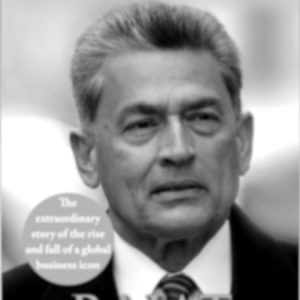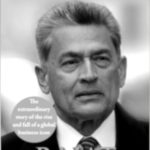
Rajat Gupta
Guest is known for...
Rajat Gupta is the former Managing Partner of McKinsey & Co., leading the firm across three terms from 1994 to 2003. He was convicted of insider trading in 2012 and sentenced to two years in jail. He has recently published his memoir, “Mind without Fear,” with Juggernaut Books.
Here's what I will learn...
The podcast focuses on Rajat Gupta’s personal growth and the choices he made throughout his career at McKinsey and beyond, rather than the specifics of his trial. It offers insights into his journey and may be of interest to those seeking to learn from his experiences.
LISTEN TO THE FULL CONVERSATION
From the Podcast
Rajat speaks about how he plans to spend time in the coming years. He talks about how he plans to resume his journey of contributing to philanthropic causes and work on some of the intractable issues that the society faces.
Rajat provides some context around the style he adopted in the book and talks about the fact that notion of success is so contextual to each individual. He talks about sharing his journey candidly with people so that they could see a piece of themselves in the story and take out what makes sense for them through osmosis rather than by injection.
Rajat speaks about the kind of leadership style that’s required at the helm of a firm like McKinsey. He speaks about how one has to think about influencing and nudging rather than commanding and directing while leading a team of highly capable and self-driven people.
Rajat speaks at length about how he led McKinsey over the 3 terms when he was the Managing Partner. He says that during the first term he co-created the future strategy of the firm and started executing on it. The second term, he says, was largely around driving expansion around the world while establishing key governance processes. The third term, he says, was largely around navigating the dot com crisis after the bubble had burst.
Rajat speaks about his stints as leader in Scandinavia and in Chicago and the key levers he focused on to drive the growth of each office. He also make the distinction between the approach in Scandinavia which was significantly underpenetrated and in Chicago which had an established practice.
Rajat speaks about what it takes to build trust at the highest level with clients. He talks about how sometimes, it takes several years to cultivate a client and how the door opens at the right time if there is adequate trust that has been built with the client.
Rajat speaks about how he grew as a leader through his tenure in the firm. He speaks about the combination of mentorship, apprenticeship and entrepreneurial space where there is a vacuum that one has to rise upto as a recipe for developing leaders effectively and speaks about how that played out in Scandinavia for him.
Rajat speaks about how he evaluated opportunities outside of McKinsey through his journey. He also speaks about how he took stock of various options in front of him when he finished his third term as the Managing Partner at McKinsey.
Rajat speaks about some of the choices he is proud to have made in his journey. He also reflects on choices that he wonders if he could have made differently, especially while transitioning into the next phase of his life after McKinsey.
